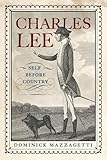Charles Lee : Self Before Country / Dominick Mazzagetti.
Material type: TextSeries: Rivergate Regionals CollectionPublisher: New Brunswick, NJ : Rutgers University Press, [2013]Copyright date: ©2013Description: 1 online resource (304 p.) : 1 map, 1 illustrationContent type:
TextSeries: Rivergate Regionals CollectionPublisher: New Brunswick, NJ : Rutgers University Press, [2013]Copyright date: ©2013Description: 1 online resource (304 p.) : 1 map, 1 illustrationContent type: - 9780813562377
- 9780813562384
- Generals -- United States -- Biography
- Generals -- United States -- Biography
- HISTORY / General
- history, united states, us, revolutionary period, biography, autobiography, historical biography, new jersey, nj, military, military history, american revolution, george washington, charles lee, patriot, british, american, veteran, french and indian war, rebellion, continental army, boston, charleston, battlefield, monmouth, court martial conviction, american rebel, fort lee, george washington bridge, political philosophy
- E207.L47 M39 2013
- E207.L47 M39 2013eb
- online - DeGruyter
- Issued also in print.
| Item type | Current library | Call number | URL | Status | Notes | Barcode | |
|---|---|---|---|---|---|---|---|
 eBook
eBook
|
Biblioteca "Angelicum" Pont. Univ. S.Tommaso d'Aquino Nuvola online | online - DeGruyter (Browse shelf(Opens below)) | Online access | Not for loan (Accesso limitato) | Accesso per gli utenti autorizzati / Access for authorized users | (dgr)9780813562384 |
Browsing Biblioteca "Angelicum" Pont. Univ. S.Tommaso d'Aquino shelves, Shelving location: Nuvola online Close shelf browser (Hides shelf browser)

|

|

|

|

|

|

|
||
| online - DeGruyter The Ex-Prisoner's Dilemma : How Women Negotiate Competing Narratives of Reentry and Desistance / | online - DeGruyter Tough on Hate? : The Cultural Politics of Hate Crimes / | online - DeGruyter Borderlands Saints : Secular Sanctity in Chicano/a and Mexican Culture / | online - DeGruyter Charles Lee : Self Before Country / | online - DeGruyter Rachel Carson and Her Sisters : Extraordinary Women Who Have Shaped America's Environment / | online - DeGruyter The Governors of New Jersey : Biographical Essays / | online - DeGruyter Health Humanities Reader / |
restricted access online access with authorization star
http://purl.org/coar/access_right/c_16ec
Dominick Mazzagetti presents an engaging account of the life of Charles Lee, the forgotten man of the American Revolution. History has not been kind to Lee-for good reason. In this compelling biography, Mazzagetti compares Lee's life and attributes to those of George Washington and offers significant observations omitted from previous Lee biographies, including extensive correspondence with British officers in 1777 that reflects Lee's abandonment of the Patriots' cause. Lee, a British officer, a veteran of the French and Indian War, and a critic of King George III, arrived in New York City in 1773 with an ego that knew no bounds and tolerated no rivals. A highly visible and newsworthy personality, he quickly took up the American cause and encouraged rebellion. As a result of this advocacy and his military skills, Lee was granted a commission as a major general in the Continental Army and soon became second-in-command to George Washington. He helped organize the defense of Boston, designed defenses for New York City, and commanded the force that repelled the British attack on Charleston. Upon his return to New York in 1776, Lee was considered by some leaders of the Revolution to be an alternative to George Washington, who was in full retreat from British forces. Lee's capture by the British in December 1776 put an end to that possibility. Lee's subsequent release in a prisoner exchange in 1778 and return to an American command led to a dramatic confrontation with Washington on the battlefield at Monmouth, New Jersey, in June 1778. Washington chastised Lee publicly for ordering an unnecessary retreat. Lee suffered the ignominy of a court-martial conviction for this blunder and spent the remaining years to his death in 1782 attacking Washington. Although few doubted Lee's loyalty at the time, his actions at Monmouth fueled speculation that he switched sides during his imprisonment. A discovery years after his death completed Lee's tale. In 1862, a researcher discovered "Mr. Lee's Plan," a detailed strategy for the defeat of the American rebels delivered to British General William Howe while Lee was held in captivity. This discovery sealed Lee's historical record and ended all further discussion of his contributions to the American Revolution. Today, few people even realize that Fort Lee, on the New Jersey side of the George Washington Bridge, was named in his honor.
Issued also in print.
Mode of access: Internet via World Wide Web.
In English.
Description based on online resource; title from PDF title page (publisher's Web site, viewed 24. Mai 2022)


